by Joanne Ivancic* (Advanced Biofuels USA) Conferences serve to present the current thoughts, activities and plans for the community involved in the focus of the event. At the 2023 Alternative Fuels and Chemicals Coalition Global Biobased Economy Conference and Exhibit held this month just outside of Washington, DC, the overall topics were Industrial Biotechnology and Bioprocessing. The specifics were where the action was.
Every conference has its own character. Each year the zeitgeist differs, reflecting the community of attendees and presenters as well as the larger communities they represent. Buzzwords, challenges and demographics provide some indications. Here are impressions from the AFCC 2023 conference.
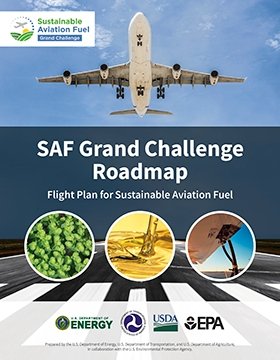 Buzzwords for 2023
Buzzwords for 2023
SAF. Sustainable Aviation Fuel. It seemed required for each participant to say “SAF” at least 10 times during the event whether in a presentation, break, or networking event. After the White House announced its Sustainable Aviation Fuel (SAF) Grand Challenge in September 2021, a “whole-of-government” approach to “produce 3 billion gallons per year of domestic SAF production that achieve a minimum of a 50% reduction in life cycle greenhouse gas emissions compared to conventional fuel by 2030”, it became OK for the Departments of Energy, Transportation, Agriculture, Defense, the National Aeronautics and Space Administration, the General Services Administration, and the Environmental Protection Agency to talk about biofuels and renewable fuels, not just about electric vehicles (EVs). As long as the renewable fuel they talk about is SAF.
Thus, developers of any conversion technologies, feedstock developments, business deals or investment plans that might have focused on production of renewable fuels for other purposes, refocused to emphasize their applications to achieve the SAF Grand Challenge goals, and the clean fuel and chemical needs of the rest of the world that related to SAF. Thus, SAF was on everyone’s lips.
Harmony. Related to another buzzword, “whole-of-government.” Speakers tried over and over to help attendees understand that a crucial element for achieving the SAF Grand Challenge goals, any other government policy goals or private investment projections is ‘harmony’ among the various government agencies, financing institutions, researchers, developers, and consumers. It merits repeating because it is so hard to achieve a unified vision, shared concepts of how to achieve the vision without hindering innovation, and an economic system that can support the hard day-to-day work, workers and investment community needed to make sure the vision and innovation don’t collapse into delusion.
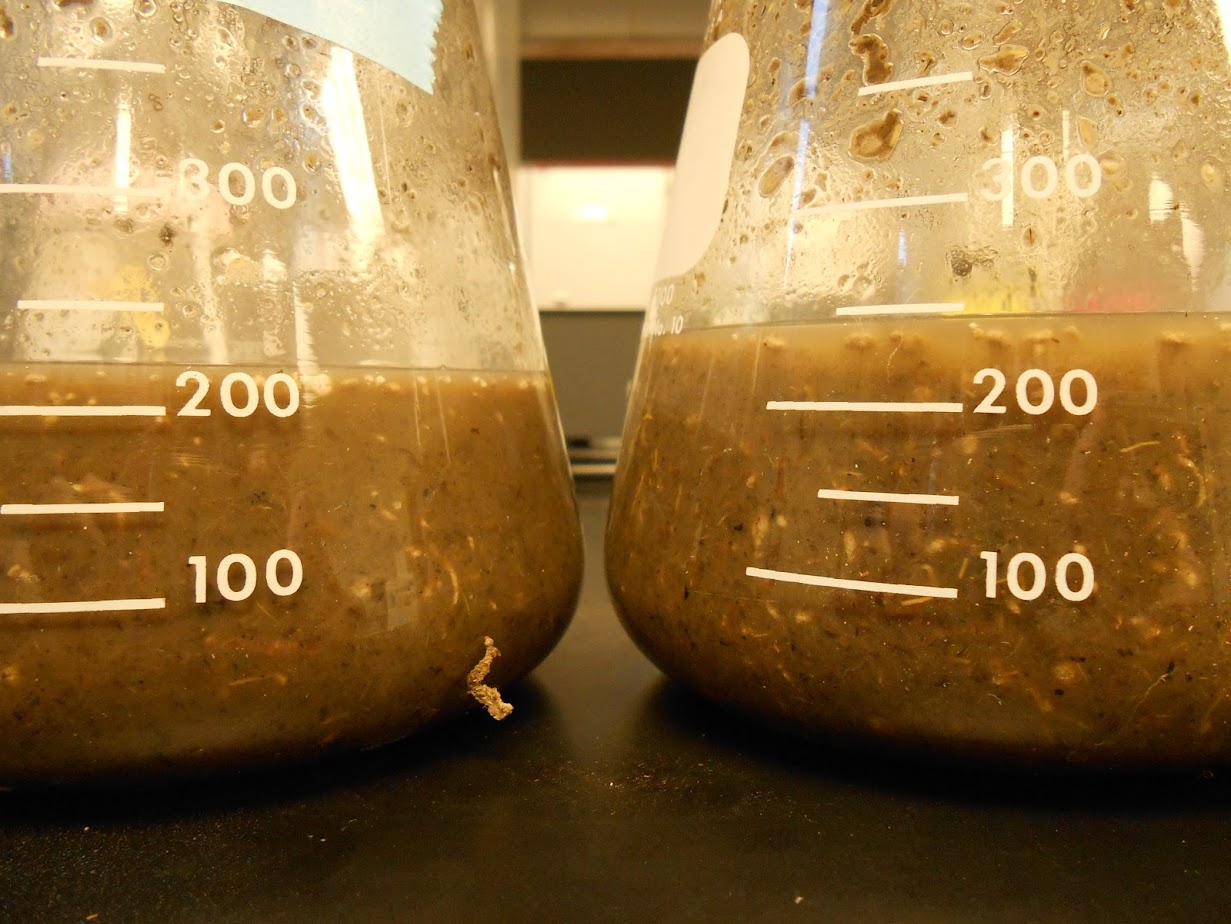 Balance. Complementary to ‘harmony.’ Among other things, this recognizes that all the innovations designed to achieve the vision may not work; that the system must balance developing existing sure-things with encouraging and supporting innovations even through those innovations might prove to be learning experiences that stimulate improved research and set foundations for other approaches. What some might call “failures”, but the real buzzword for that circular, balanced system is “DBTL” Design Build Test Learn followed by Redesign, Rebuild, Retest, Learn Again. Repeat as needed. Otherwise known as ‘science’ and ‘engineering’.
Balance. Complementary to ‘harmony.’ Among other things, this recognizes that all the innovations designed to achieve the vision may not work; that the system must balance developing existing sure-things with encouraging and supporting innovations even through those innovations might prove to be learning experiences that stimulate improved research and set foundations for other approaches. What some might call “failures”, but the real buzzword for that circular, balanced system is “DBTL” Design Build Test Learn followed by Redesign, Rebuild, Retest, Learn Again. Repeat as needed. Otherwise known as ‘science’ and ‘engineering’.
Replacing the Whole Barrel. Transitioning from a fossil carbon-based economy to one based on agriculture, aquaculture, forestry and waste management is not easy. This conference, by clearly incorporating fuels and chemicals together rather than sticking them in silos, reinforces their interrelationships. At least three presenters, and likely more, showed some version of the an image of the products that come from a barrel of oil. The chemicals make the money. Fuels are made from the parts that can’t be used to make more profitable products (except for what’s required to make sure the fuel meets environmental and performance requirements). It is economically infeasible to do away with one without figuring out what to do with the other.
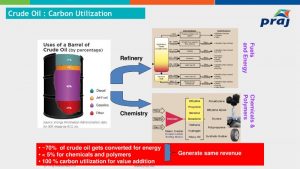 Real Refinery. Or something similar meaning that biorefineries will increasingly make multiple products from their feedstock, just like oil refineries make everything under the sun from petroleum feedstock. Certainly, these exist now; and examples are also being built that showcase the layout for the future.
Real Refinery. Or something similar meaning that biorefineries will increasingly make multiple products from their feedstock, just like oil refineries make everything under the sun from petroleum feedstock. Certainly, these exist now; and examples are also being built that showcase the layout for the future.
For example, an ethanol biorefinery that uses feedstocks like corn/maize, wheat, cassava, etc., today also makes animal feed and maybe CO2 for beverages or industrial purposes; a biodiesel biorefinery may also sell co-products like animal feed and glycerin. New biorefineries and refineries that are part of waste management systems also produce other chemicals and sugars that can be sold as building blocks for other industrial purposes. And oil refineries are starting to replace parts of their petroleum crude oil with biocrude or syncrude for co-processing.
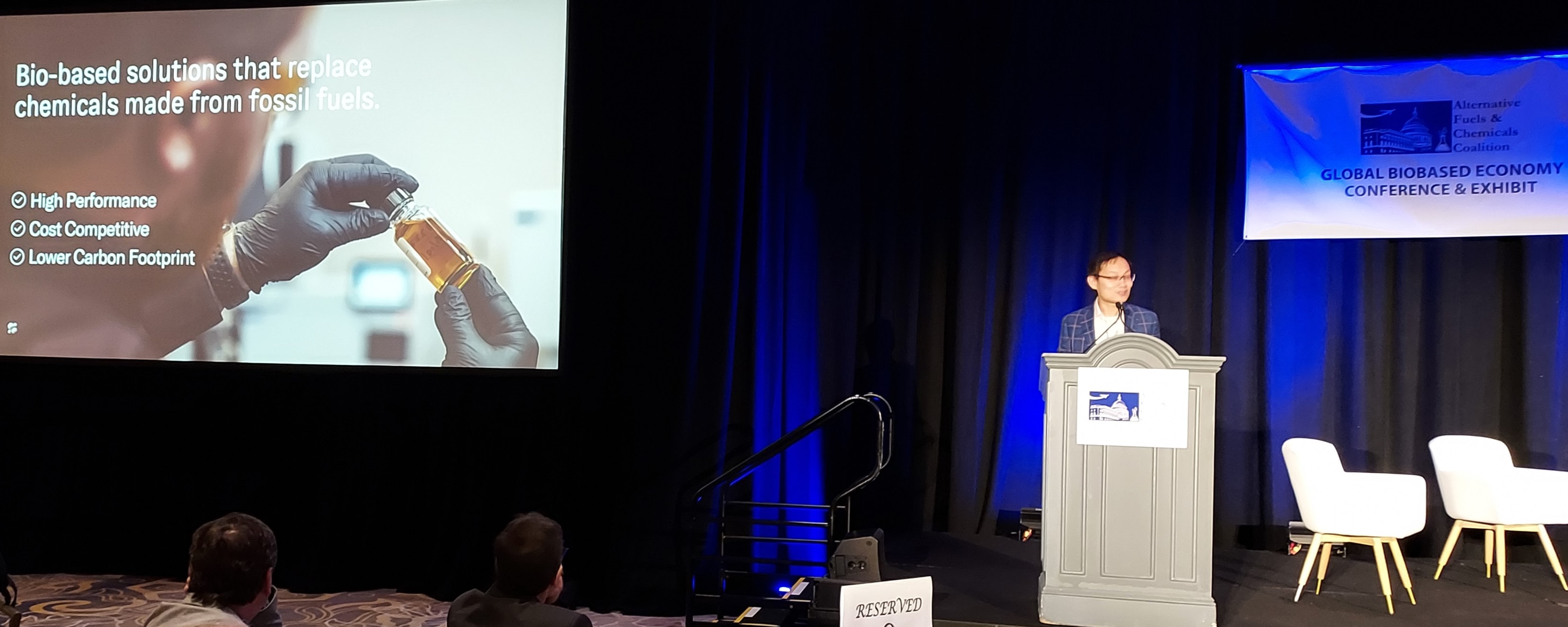
Litany of Challenges
None of this is easy. Not including the difficulties related to obtaining financing, and in no particular order, here are just some of the challenges mentioned in various presentations:
- There are no US government incentives for biorefineries to also make renewable, sustainable chemicals as there are incentives for renewable fuels.
- More US government funds are available for development of hydrogen and renewable hydrogen from the Biden Administration than have been available for development of bio- and renewable fuels since such funds have been available from about the Carter Administration’s era.
- Investors need to understand that these projects can take 7-10 years to bring to commercialization, even with pilot or demonstration scale completed. “Managing investor expectations.” What’s needed? Time, money, leadership, commitment.
- Soil carbon science needs to be better developed so farmers can get credit and compensation for the work it takes to maximize carbon removed from the air via photosynthesis and stored in the ground; and the testing and data collection and monitoring related to this. Do cover crops enhance yield the following years or harm it?
- Requests for more modular systems. And the strategy of starting small with the option to grow “when the billions come in.”
- For new SAF pathways especially, getting through the ASTM process.
- “We need to outpace the Industrial Revolution.”
- Everyone wants to be first to be second.
- IRS delays in setting rules for SAF tax credits.
- Water consumption and waste disposal related to hydrogen production from electrolysis.
- Efforts toward using 100% SAF; and lack thereof for 100% renewables for ground transportation other than renewable diesel/HVO.
- Perception and emotional issues such as farmers preferring markets that put monetary value on crops and perception of subsidy programs as charity.
- Carbon intensity scores are not enough. Need standard protocol.
- Emphasize other pollutants mitigated or avoided by renewable fuels; and benefits related to UN Sustainable Development Goals.
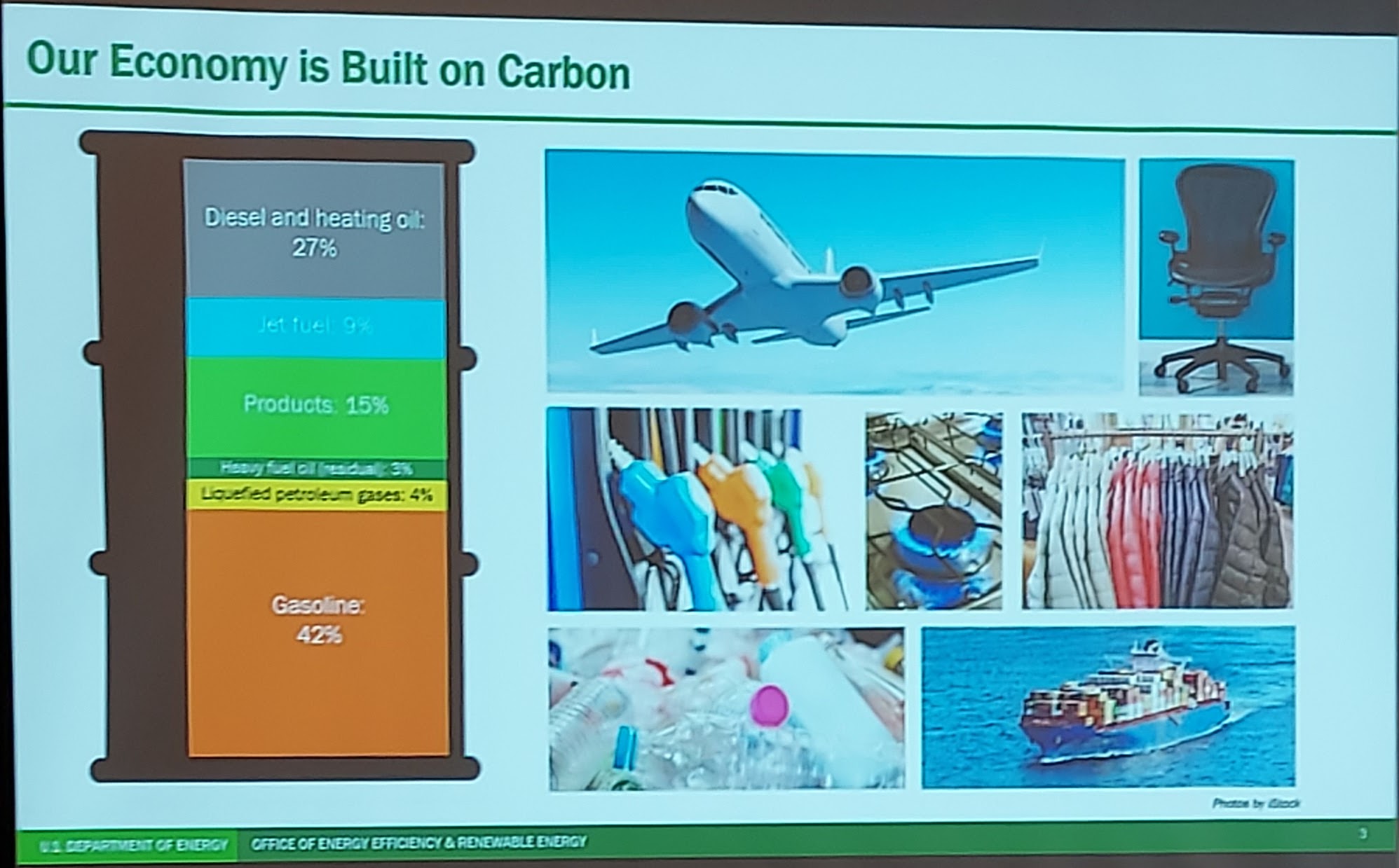
- People should understand that we are talking about defossilization, not just decarbonization. We are talking about needing hydrocarbon fuels and products made from carbon for a long time. And, WE are carbon.
- The renewable fuels world welcomes people from the oil/gas world. They have the knowledge and assets to make a transition to renewables. As one speaker making the transition noted, making renewable fuels is more complex than he imagined. There’s plenty of overlap, but the world of drilling wells and the world of growing crops and managing waste have significant differences.
- Distrust of policy, especially of executive orders. Distrust of short-term legislation like the SAF tax credits.
- Plastics. And everything and anything that has to do with making, using, disposing of or converting them.
- Differences among biodegradable, compostable, degradable, recyclable …. Approval for organic growing.
- Purpose-grown energy and biofuel crops.
- Chloride problem in grasses
- Lack of government incentives to build internal combustion engine vehicles that can use high ratios of renewable fuels. Disincentives to getting EPA approval for existing and new vehicles that could use E85. Or developing drop-in renewable fuels for existing fleet.
- Lack of high quality, effective communication with the general public about benefits of renewable fuels and chemicals/materials. Assumption that the public understands what the participants at this conference understand about value of renewable alternative fuels and chemicals.
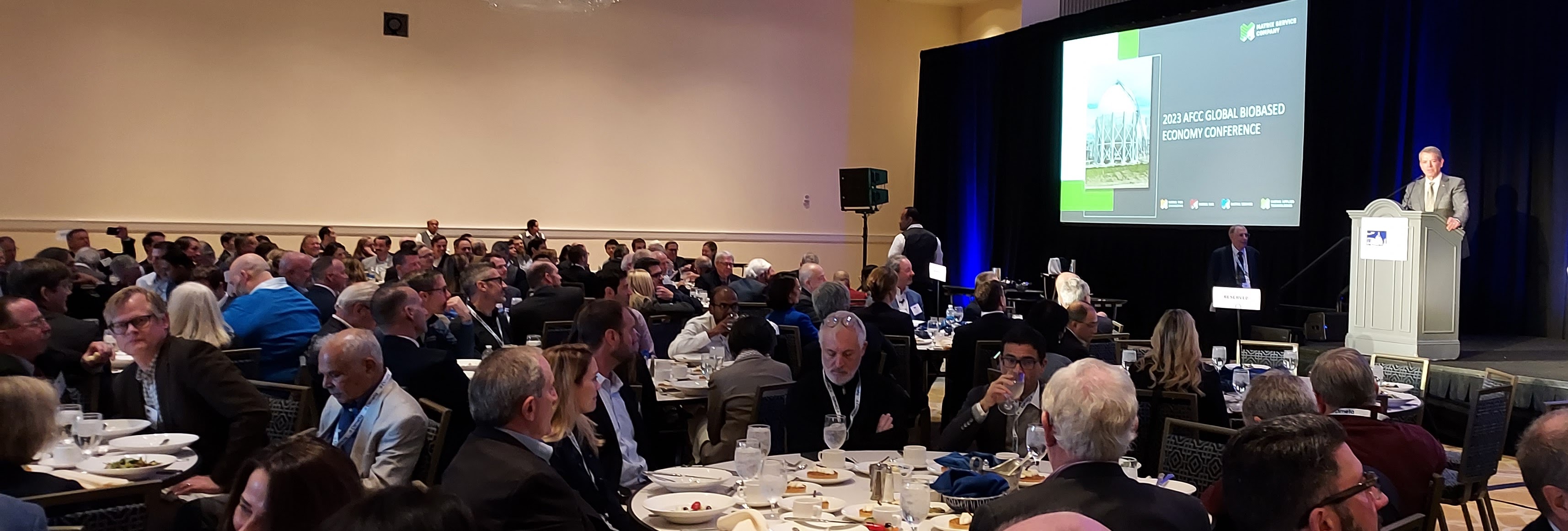
Thank Goodness for the Next Generations (and not just biofuels)
In addition to leaders of established businesses and government agencies, this conference seems to make an effort to also attract early and mid-career professionals and students to the mix, an effort that is to be applauded and encouraged.
For example, Syracuse University’s Dynamic Sustainability Lab had a booth in the exhibit hall and a group of students staffing it and attending presentations.
A few attendees commented that it was refreshing to hear from so many people really trying to do things, not just talking about them.
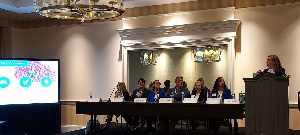 Another example was a research student from University of California Los Angeles who was able to meet almost all of his grant requirements to interview something like 90 experts related to some aspect of his research in order to direct it into a useful, economically feasible direction. Not only was he able to do some basic networking, he was thrilled with the candid advice he received from people who really understood what his research was about and shared ideas about how it could benefit efforts to mitigate climate change; how it could help address real-world challenges that they were facing.
Another example was a research student from University of California Los Angeles who was able to meet almost all of his grant requirements to interview something like 90 experts related to some aspect of his research in order to direct it into a useful, economically feasible direction. Not only was he able to do some basic networking, he was thrilled with the candid advice he received from people who really understood what his research was about and shared ideas about how it could benefit efforts to mitigate climate change; how it could help address real-world challenges that they were facing.
Other organizations have foundations that support scholarships for students to attend their conferences and to sponsor student or young professional groups that share an interest in the organizations’ topics. AFCC should do something along those lines.
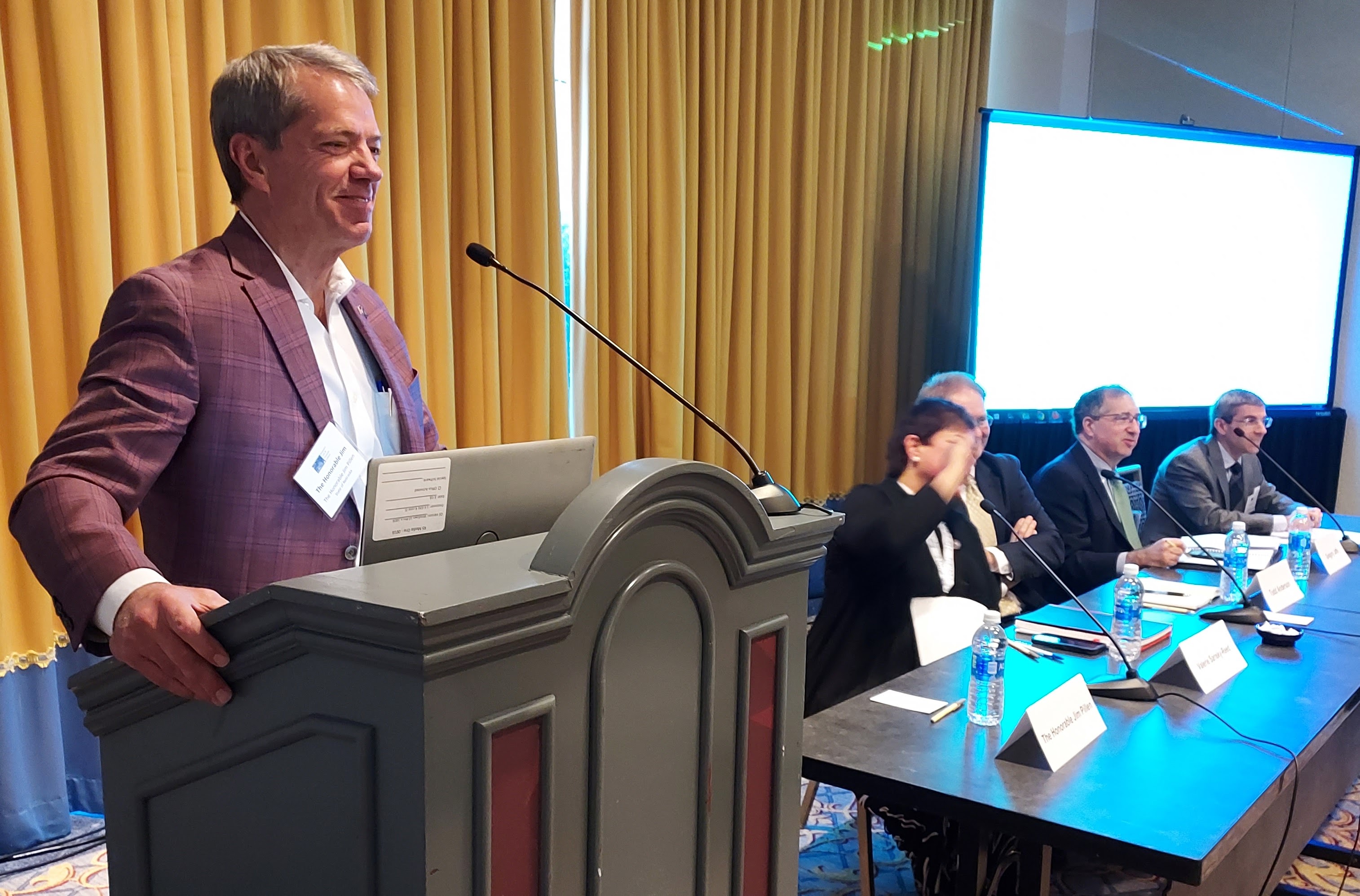
Federal Agencies Briefing
Conclusion
In the few years of its existence, this organization has found a way to identify and meet the needs of the alternative chemical and fuels community. The significant attendance, fascinating presentations and valuable conversations characteristic of this conference show its value in gathering and moving forward a diverse industry. Especially useful is the incorporation of federal government agency presentations and of appearances by state officials such as Nebraska Governor Jim Pillen who participated in person at Sunday and Monday programs and video addresses by governors from Louisiana and Delaware.
With the multi-track organization of the conference, no one can see and hear everything. Whatever you can attend will prove insightful, informative and will pique further interest and inspiration to continue this crucial work. READ MORE
* Joanne Ivancic serves as the executive director of Advanced Biofuels USA
Symposium audio Climate Smart Commodities & The Bioeconomy
Symposium audio Development of Standards for Industrial Biotechnology and Synthetic Biology – Recent Progress and Future Opportunities
Symposium audio Unlocking the Value of Algae
Symposium audio Federal Agencies Briefing: Executive Order 14081 to Promote Industrial Biotechnology and Biomanufacturing
Workshop audio State of the Art Bioeconomy Project Financing: Debt, Equity, Insurance and Contract Structures
Workshop audio Diversity of Feedstocks to Meet Sustainable Aviation Fuels (SAF) and Renewable Chemicals Goals. Presentations: Lynn Wendt, Wendy Owens, Matthew Langholtz, Brian Stanton, Mark Elless
Workshop audio Understanding the Economics of Carbon Navigating Different Prices Across Diverse Markets Fuel. Presentations: Matthew Stone, Dan Dunleavy, Kate Shenk, Dwight Lynch
Presentations and audio for Track 1, Session 1, Low Carbon Intensity (CI Score) Biobased Products from Waste, and carbon fermentation. Presentations: Cesar Granda, Molly Morse, Larry Feinberg
Presentations and audio for Track 1, Session 3, Business Strategies for Biomaterials. Presentations: Phil Van Trump, Jill Zullo, Jon Veldhouse, Michael Saltzberg, Brian Gordan, Max Senechal
Presentations and audio for Track 1, Session 5, Advancements in the Production of Bioplastics and Biomaterials. Presentations: Lauren Scott, Sasisanker Padmanabhan, Daniel MacEachran, Kelly Knopp, Jacqueline Amable
Presentations and audio for Track 1, Session 6, The Role of Biotech in Building a More Sustainable Economy
Presentations and audio for Track 2, Session 1, Process Development Requirements for Scaling SAF. Presentations: Nick Andrews, Steven Slome,
Presentations and audio for Track 2, Session 2, Innovations in MSW Management at Landfills. Presentations: Kate Chapman
Presentations and audio for Track 2, Session 3, Technology Readiness and Scaling Sustainable Aviation Fuels (SAF): Presentations: Rich Nordin, Marcella Franchi, Dave Kettner, Marc Delcourt
Presentations and audio for Track 2, Session 4, Using Forest Feedstock under the Renewable Fuel Standard to Mitigate Catastrophic Wildfires, Improve Forest Health and Energize the Economy. Presentations: Valerie Sarisky Reed, David Neumann, Scott Dane, Julie Tucker, Byron Bunker, Paul Schubert
Presentations and audio for Track 2, Session 5, What Does Sustainability Mean to Airlines, Producers, and Government. Presentations: Mark Rumizen
Presentations for Track 2, Session 6, 2G Biofuels Production- Cleaner Processes and Partnerships. Presentations: John Doyle, Berit Foss, Clemens Heikaus, Shrikant Rathi
Presentations for Track 3, Session 1, Sustainable Supply Chain Strategies and Management for Manufacturers. Presentations: Peter Jackman, Alex Ward
Presentations and audio for Track 3, Session 2, Sustainable Cosmetics and Personal Care Ingredients
Presentations and audio for Track 3, Session 3, Biotech and the ESG Missions of Brand Owners
Presentations and audio for Track 3, Session 4, New Biobased Product Alternatives for Industrial Applications. Presentations: William Armiger, Tom Beardsiee, Mark Chandler
Presentations and audio for Track 3, Session 5, Opportunities and Challenges in Bio-based Products. Presentations: John Shaw, Derek Greenfield, Darcy Prather, Eric Steen, Kristian Gubsch
Presentations and audio for Track 3, Session 6, Enzymolysis and Fermentation Trends to New Renewable Chemicals. Presentations: Ken Barrett, Lewis Dutel, Mark Johnson, Brian Fisher, Bret Strogen
Presentations for Track 4, Session 3, Boosts to Enrich Soil & Beneficial Plant Traits for Production of Agri Products. Presentations: David Glass, Josh Silverman, Ben Cloud
Presentations for Track 4, Session 4, Significant Advances in Environmental Analytics and Their Important Commercial Impact on the Bio-Based Economy. Presentations: Jule Bushell, Bill Salas, Josh Collins, Robin Woodward, Paul Zorner
Presentations and audio for Track 4, Session 5, The Value of Soil Carbon Capture Sequestration (SCCS) for Carbon Negative Solutions (Low Carbon Intensity CI score materials). Presentations: Paul Overby, Mitchell Hora, Karen Boyd, Charlotte Levy, Carrie Werkmeister, Aldyen Donnely
Presentations and audio for Track 5, Session 1, Alternative Fuels – Current Status for Infrastructure and Manufacturing for New Biofuels. Presentations, Joshua Velson, Andrew Miller, Nirav Patel
Presentations and audio for Track 5, Session 2, Building the Supply Chain: Biofuels and Biomaterials. Presentations: Timothy Bauer, Matt Herman, Guy Penard, Manjusri Misra
Presentations for Track 5, Session 3, SynBio & The New Normal of Low Capital Availability. Presentations: Brentan Alexander, Roger Wyse
Presentations and audio for Track 5, Session 4, The Importance of End-of-Life When Establishing Targets for the Bioeconomy, Presentations: Leslie Rodgers, Jeff Carbeck, Keith Edwards, Eric Klingenberg, Eugene Van Rensburg
Presentations and audio for Track 5, Session 5, What are Investors Looking for when Building Their Portfolio in Industrial Biotechnology Biobased Manufacturing? Presentations: Justin O’Rourke, John Akridge
Presentations and audio for Track 5, Session 6, Laboratory-Embedded Entrepreneur Programs Advancing the Bioeconomy. Presentations: Tommy Gibbons, Mikhail Konev, Todd Pray, Diane Bauer, Daneille Pascoli, Chris Nicholas
Photos: J.Ivancic
Nearly 55,000 articles in our online library!
Use the categories and tags listed below to access the nearly 50,000 articles indexed on this website.
Advanced Biofuels USA Policy Statements and Handouts!
- For Kids: Carbon Cycle Puzzle Page
- Why Ethanol? Why E85?
- Just A Minute 3-5 Minute Educational Videos
- 30/30 Online Presentations
- “Disappearing” Carbon Tax for Non-Renewable Fuels
- What’s the Difference between Biodiesel and Renewable (Green) Diesel? 2020 revision
- How to De-Fossilize Your Fleet: Suggestions for Fleet Managers Working on Sustainability Programs
- New Engine Technologies Could Produce Similar Mileage for All Ethanol Fuel Mixtures
- Action Plan for a Sustainable Advanced Biofuel Economy
- The Interaction of the Clean Air Act, California’s CAA Waiver, Corporate Average Fuel Economy Standards, Renewable Fuel Standards and California’s Low Carbon Fuel Standard
- Latest Data on Fuel Mileage and GHG Benefits of E30
- What Can I Do?
Donate
DonateARCHIVES
- March 2026
- February 2026
- January 2026
- December 2025
- November 2025
- October 2025
- September 2025
- August 2025
- July 2025
- June 2025
- May 2025
- April 2025
- March 2025
- February 2025
- January 2025
- December 2024
- November 2024
- October 2024
- September 2024
- August 2024
- July 2024
- June 2024
- May 2024
- April 2024
- March 2024
- February 2024
- January 2024
- December 2023
- November 2023
- October 2023
- September 2023
- August 2023
- July 2023
- June 2023
- May 2023
- April 2023
- March 2023
- February 2023
- January 2023
- December 2022
- November 2022
- October 2022
- September 2022
- August 2022
- July 2022
- June 2022
- May 2022
- April 2022
- March 2022
- February 2022
- January 2022
- December 2021
- November 2021
- October 2021
- September 2021
- August 2021
- July 2021
- June 2021
- May 2021
- April 2021
- March 2021
- February 2021
- January 2021
- December 2020
- November 2020
- October 2020
- September 2020
- August 2020
- July 2020
- June 2020
- May 2020
- April 2020
- March 2020
- February 2020
- January 2020
- December 2019
- November 2019
- October 2019
- September 2019
- August 2019
- July 2019
- June 2019
- May 2019
- April 2019
- March 2019
- February 2019
- January 2019
- December 2018
- November 2018
- October 2018
- September 2018
- August 2018
- July 2018
- June 2018
- May 2018
- April 2018
- March 2018
- February 2018
- January 2018
- December 2017
- November 2017
- October 2017
- September 2017
- August 2017
- July 2017
- June 2017
- May 2017
- April 2017
- March 2017
- February 2017
- January 2017
- December 2016
- November 2016
- October 2016
- September 2016
- August 2016
- July 2016
- June 2016
- May 2016
- April 2016
- March 2016
- February 2016
- January 2016
- December 2015
- November 2015
- October 2015
- September 2015
- August 2015
- July 2015
- June 2015
- May 2015
- April 2015
- March 2015
- February 2015
- January 2015
- December 2014
- November 2014
- October 2014
- September 2014
- August 2014
- July 2014
- June 2014
- May 2014
- April 2014
- March 2014
- February 2014
- January 2014
- December 2013
- November 2013
- October 2013
- September 2013
- August 2013
- July 2013
- June 2013
- May 2013
- April 2013
- March 2013
- February 2013
- January 2013
- December 2012
- November 2012
- October 2012
- September 2012
- August 2012
- July 2012
- June 2012
- May 2012
- April 2012
- March 2012
- February 2012
- January 2012
- December 2011
- November 2011
- October 2011
- September 2011
- August 2011
- July 2011
- June 2011
- May 2011
- April 2011
- March 2011
- February 2011
- January 2011
- December 2010
- November 2010
- October 2010
- September 2010
- August 2010
- July 2010
- June 2010
- May 2010
- April 2010
- March 2010
- February 2010
- January 2010
- December 2009
- November 2009
- October 2009
- September 2009
- August 2009
- July 2009
- June 2009
- May 2009
- April 2009
- March 2009
- February 2009
- January 2009
- December 2008
- November 2008
- October 2008
- September 2008
- August 2008
- July 2008
- June 2008
- May 2008
- April 2008
- March 2008
- February 2008
- January 2008
- December 2007
- November 2007
- October 2007
- September 2007
- August 2007
- June 2007
- February 2007
- January 2007
- October 2006
- April 2006
- January 2006
- April 2005
- December 2004
- November 2004
- December 1987
CATEGORIES
- About Us
- Advanced Biofuels Call to Action
- Aviation Fuel/Sustainable Aviation Fuel (SAF)
- BioChemicals/Renewable Chemicals
- BioRefineries/Renewable Fuel Production
- Business News/Analysis
- Cooking Fuel
- Education
- 30/30 Online Presentations
- Competitions, Contests
- Earth Day 2021
- Earth Day 2022
- Earth Day 2023
- Earth Day 2024
- Earth Day 2025
- Executive Training
- Featured Study Programs
- Instagram TikTok Short Videos
- Internships
- Just a Minute
- K-12 Activities
- Mechanics training
- Online Courses
- Podcasts
- Scholarships/Fellowships
- Teacher Resources
- Technical Training
- Technician Training
- University/College Programs
- Events
- Coming Events
- Completed Events
- More Coming Events
- Requests for Speakers, Presentations, Posters
- Requests for Speakers, Presentations, Posters Completed
- Webinars/Online
- Webinars/Online Completed; often available on-demand
- Federal Agency/Executive Branch
- Agency for International Development (USAID)
- Agriculture (USDA)
- Commerce Department
- Commodity Futures Trading Commission
- Congressional Budget Office
- Defense (DOD)
- Air Force
- Army
- DARPA (Defense Advance Research Projects Agency)
- Defense Logistics Agency
- Marines
- Navy
- Education Department
- Energy (DOE)
- Environmental Protection Agency
- Federal Energy Regulatory Commission (FERC)
- Federal Reserve System
- Federal Trade Commission
- Food and Drug Administration
- General Services Administration
- Government Accountability Office (GAO)
- Health and Human Services (HHS)
- Homeland Security
- Housing and Urban Development (HUD)
- Interior Department
- International Trade Commission
- Joint Office of Energy and Transportation
- Justice (DOJ)
- Labor Department
- National Academies of Sciences Engineering Medicine
- National Aeronautics and Space Administration
- National Oceanic and Atmospheric Administration
- National Research Council
- National Science Foundation
- National Transportation Safety Board (NTSB)
- Occupational Safety and Health Administration
- Overseas Private Investment Corporation
- Patent and Trademark Office
- Securities and Exchange Commission
- State Department
- Surface Transportation Board
- Transportation (DOT)
- Federal Aviation Administration
- National Highway Traffic Safety Administration (NHTSA)
- Pipeline and Hazardous Materials Safety Admin (PHMSA)
- Treasury Department
- U.S. Trade Representative (USTR)
- White House
- Federal Legislation
- Federal Litigation
- Federal Regulation
- Feedstocks
- Agriculture/Food Processing Residues nonfield crop
- Alcohol/Ethanol/Isobutanol
- Algae/Other Aquatic Organisms/Seaweed
- Atmosphere
- Carbon Dioxide (CO2)
- Field/Orchard/Plantation Crops/Residues
- Forestry/Wood/Residues/Waste
- hydrogen
- Manure
- Methane/Biogas
- methanol/bio-/renewable methanol
- Not Agriculture
- RFNBO (Renewable Fuels of Non-Biological Origin)
- Seawater
- Sugars
- water
- Funding/Financing/Investing
- grants
- Green Jobs
- Green Racing
- Health Concerns/Benefits
- Heating Oil/Fuel
- History of Advanced Biofuels
- Infrastructure
- Aggregation
- Biofuels Engine Design
- Biorefinery/Fuel Production Infrastructure
- Carbon Capture/Storage/Use
- certification
- Deliver Dispense
- Farming/Growing
- Precursors/Biointermediates
- Preprocessing
- Pretreatment
- Terminals Transport Pipelines
- International
- Abu Dhabi
- Afghanistan
- Africa
- Albania
- Algeria
- Angola
- Antarctica
- Arctic
- Argentina
- Armenia
- Aruba
- Asia
- Asia Pacific
- Australia
- Austria
- Azerbaijan
- Bahamas
- Bahrain
- Bangladesh
- Barbados
- Belarus
- Belgium
- Belize
- Benin
- Bermuda
- Bhutan
- Bolivia
- Bosnia and Herzegovina
- Botswana
- Brazil
- Brunei
- Bulgaria
- Burkina Faso
- Burundi
- Cambodia
- Cameroon
- Canada
- Canary Islands
- Caribbean
- Central African Republic
- Central America
- Chad
- Chile
- China
- Colombia
- Congo
- Congo, Democratic Republic of
- Costa Rica
- Croatia
- Cuba
- Cyprus
- Czech Republic
- Denmark
- Dominican Republic
- Dubai
- Ecuador
- Egypt
- El Salvador
- Equatorial Guinea
- Estonia
- Eswatini/Swaziland
- Ethiopia
- European Union (EU)
- Fiji
- Finland
- France
- French Guiana
- Gabon
- Georgia
- Germany
- Ghana
- Global South
- Greece
- Greenland
- Grenada
- Guatemala
- Guinea
- Guyana
- Haiti
- Honduras
- Hong Kong
- Hungary
- Iceland
- India
- Indonesia
- Iran
- Iraq
- Ireland
- Israel
- Italy
- Ivory Coast
- Jamaica
- Japan
- Jersey
- Jordan
- Kazakhstan
- Kenya
- Korea
- Kosovo
- Kuwait
- Laos
- Latin America
- Latvia
- Lebanon
- Liberia
- Lithuania
- Luxembourg
- Macedonia
- Madagascar
- Malawi
- Malaysia
- Maldives
- Mali
- Malta
- Marshall Islands
- Mauritania
- Mauritius
- Mexico
- Middle East
- Moldova
- Monaco
- Mongolia
- Morocco
- Mozambique
- Myanmar/Burma
- Namibia
- Nepal
- Netherlands
- New Guinea
- New Zealand
- Nicaragua
- Niger
- Nigeria
- North Africa
- North America
- North Korea
- Northern Ireland
- Norway
- Oman
- Pakistan
- Panama
- Papua New Guinea
- Paraguay
- Peru
- Philippines
- Poland
- Portugal
- Qatar
- Republic of
- Romania
- Russia
- Rwanda
- Saudi Arabia
- Scotland
- Senegal
- Serbia
- Sierra Leone
- Singapore
- Slovakia/Slovak Republic
- Slovenia
- Solomon Islands
- South Africa
- South America
- South Korea (Republic of Korea)
- South Sudan
- Southeast Asia
- Spain
- Sri Lanka
- Sudan
- Suriname
- Sweden
- Switzerland
- Taiwan
- Tanzania
- Thailand
- Timor-Leste
- Togo
- Trinidad and Tobago
- Tunisia
- Turkey
- Uganda
- UK (United Kingdom)
- Ukraine
- United Arab Emirates UAE
- Uruguay
- Uzbekistan
- Vatican
- Venezuela
- Vietnam
- Wales
- Zambia
- Zanzibar
- Zimbabwe
- Marine/Boat Bio and Renewable Fuel/MGO/MDO/SMF
- Marketing/Market Forces and Sales
- Opinions
- Organizations
- Original Writing, Opinions Advanced Biofuels USA
- Policy
- Presentations
- Biofuels Digest Conferences
- DOE Conferences
- Bioeconomy 2017
- Bioenergy2015
- Biomass2008
- Biomass2009
- Biomass2010
- Biomass2011
- Biomass2012
- Biomass2013
- Biomass2014
- DOE Project Peer Review
- Other Conferences/Events
- R & D Focus
- Carbon Capture/Storage/Use
- Co-Products
- Feedstock
- Logistics
- Performance
- Process
- Vehicle/Engine/Motor/Aircraft/Boiler/Ship
- Yeast
- Railroad/Train/Locomotive Fuel
- Resources
- Books Web Sites etc
- Business
- Definition of Advanced Biofuels
- Find Stuff
- Government Resources
- Scientific Resources
- Technical Resources
- Tools/Decision-Making
- Rocket/Missile Fuel
- Sponsors
- States
- Alabama
- Alaska
- Arizona
- Arkansas
- California
- Colorado
- Connecticut
- Delaware
- Florida
- Georgia
- Hawai'i
- Idaho
- Illinois
- Indiana
- Iowa
- Kansas
- Kentucky
- Louisiana
- Maine
- Maryland
- Massachusetts
- Michigan
- Midwest
- Minnesota
- Mississippi
- Missouri
- Montana
- Native American tribal nation lands
- Nebraska
- Nevada
- New Hampshire
- New Jersey
- New Mexico
- New York
- North Carolina
- North Dakota
- Ohio
- Oklahoma
- Oregon
- Pennsylvania
- Puerto Rico
- Rhode Island
- South Carolina
- South Dakota
- Tennessee
- Texas
- Utah
- Vermont
- Virginia
- Washington
- Washington DC
- West Coast
- West Virginia
- Wisconsin
- Wyoming
- Sustainability
- Uncategorized
- What You Can Do
tags
© 2008-2023 Copyright Advanced BioFuels USA. All Rights reserved.
.jpg)





Comments are closed.